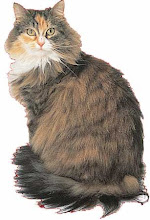Maine Coon Cat Health Considerations
No one likes to think their beloved Maine Coon cat could be taken ill and possibly die suddenly. Unfortunately, Maine Coon cats do have a track record as a breed for hypertrophic cardiomyopathy (HCM). This is a common disease in cats, but seems to be more prevalent in Maine Coons. Recent goods news indicates that a gene mutation (linked to sarcomeric proteins) found in Maine Coon cats is related to HCM, and it is good news because once identified there is the potential to save lives.
HCM is the leading cause of sudden death for indoor adult cats. The cardiac myosin binding protein C is not correctly incorporated into the heart muscle of the Maine Coon cats with HCM. Were there any symptoms prior to the unexpected death? Usually no, it just happens which makes it all the more difficult to deal with. It is sometimes diagnosed in cats as a result of something like a blood clot that produces symptoms of a stroke. Although this can be treated, the strokes will continue and get worse. There are drugs that can be used in situations where the cat has been diagnosed with HCM, however they seem to be producing mixed results at best.
Hypertrophic cardiomyopathy is when the left chamber of the heart thickens. Because the chamber is thicker, it causes the heart to work harder. It occasionally can be diagnosed if the Veterinarian hears a heart murmur or a very rapid heartbeat. Keep in mind though that these symptoms can also mean something else. HCM can be identified using ultra-sound. By the way the Maine Coon cat is not the only one with this gene anomaly. It also shows up in the American Shorthair, Devon Rex, Persian, and Ragdoll.
How do these findings affect breeding? Good question. Since HCM doesn't show up until the cats are older, it's almost impossible to weed out HCM carriers. They may enter adulthood having already sired several litters, and then it's discovered they have HCM. By then the genes have likely been passed on to other generations. With the ability to now identify the gene in a Maine Coon cat, the hope is that a test can pinpoint carriers of this disease in kittens. This may also result in the creation of a drug to intervene.
Another disease you should be aware of in your Maine Coon cat is spinal muscular atrophy. The genetic cause of this was tracked in 2005 and because of this break through there is now an easy and highly reliable DNA carrier test.
Spinal muscular atrophy is the result of the death of spinal cord neurons that send signals to the trunk and limb muscles. This can been seen as early as 3 months in youngsters that develop an odd swaying gait of the hindquarters and in how they stand with their hocks just about touching. At about 5 months they are too weak to jump and any landings attempted are clumsy. These kittens, and later as adults, are not in pain, eat and play well and live relatively long, good lives as indoor cats.
How does this affect a breeding program? Spinal muscular atrophy is inherited by acquiring the gene from both parents. It is known as a simple autosomal recessive trait and it affects male and female kittens equally. The problem is the parents don't show signs of the disease, but are classified as carriers. So, if a carrier is not identified, they could pass this trait on. To identify a carrier DNA is collected from cat cheek cells, blood or frozen semen. You can do this strictly confidential test by contacting a lab directly to submit samples.
Your Maine Coon cat may also contract polycystic kidney disease – an irreversible, inherited disorder once thought to happen only in Persians and Persian related cats. It does not show up until later in life – usually around the age of seven or so. Polycystic kidney disease causes renal failure and can be identified through several signs. Watch for depression, a reduced appetite, more frequent drinking and urination, loss of weight and bouts of vomiting.
Treatment for this is the same as treatment for chronic kidney failure and involves a restricted protein and phosphorus diet, phosphorus binders, Vitamin D and Erythropoietin. In some cases your vet will use subcutaneous fluids.
Watch for hip dysplasia that may affect one or both hips. This is another inherited trait involving multiple gene pairs – meaning both parents have hip dysplasia or carry the genes for it. This condition develops over time due to an improperly fitting femoral head into the hip socket and eventually causes osteoarthritis.
Can regular vet visits help maintain the health of your Maine Coon cat? Yes they can, and we encourage you to take your special pet for an exam if you have any health concerns at all.
18 ways to stop cat urine odour
Get rid of your cat urine odor problem once and for all!
You don't have to spend hundreds of dollars and hours of time cleaning cat puddles. You don't have to be angry with your kitty.
Here's 18 kitty-researched and cat-tested solutions.
I guarantee one going's to work for you.
Check out 18 ways to stop cat urine odour
You don't have to spend hundreds of dollars and hours of time cleaning cat puddles. You don't have to be angry with your kitty.
Here's 18 kitty-researched and cat-tested solutions.
I guarantee one going's to work for you.
Check out 18 ways to stop cat urine odour
Sunday, 4 May 2008
Subscribe to:
Post Comments (Atom)

No comments:
Post a Comment